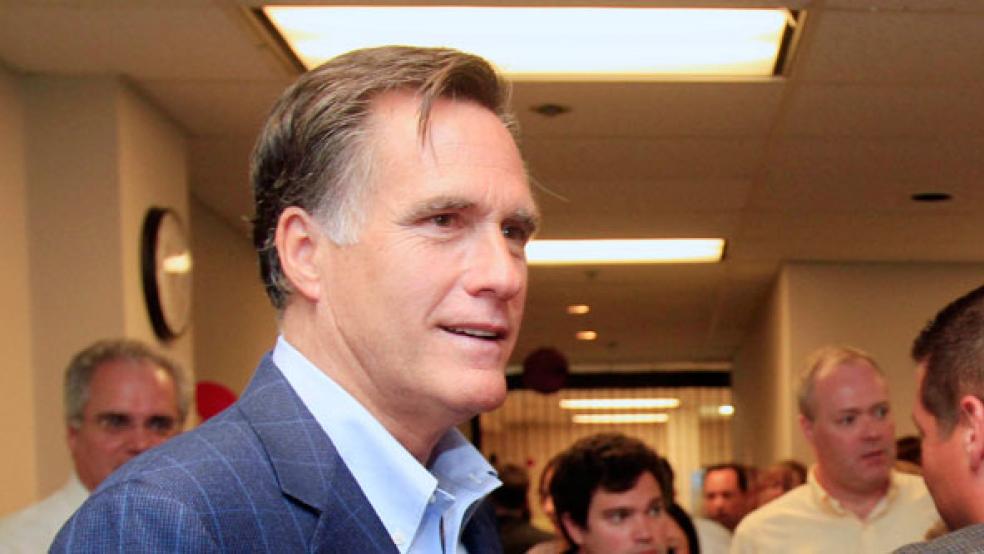Mitt Romney has this going for him: he is a proven turnaround artist. The former governor of Massachusetts cut his professional teeth at Bain Capital, a company specializing in making sick companies well and underperforming assets valuable. At a recent campaign stop, he says he turned around the Olympics, he turned around Massachusetts, and he is now ready to turn around the United States.
How will Romney lead the country if elected? And, what would he have done differently these past three years? The former governor jumps into this conversation with vigor-- the kind that bespeaks conviction. This is clearly Romney’s comfort zone. The first, second and third rule of any turnaround, he says, is focus, focus and focus – finding out what is critical to the turnaround and focusing on it. Had he been in President Obama’s shoes, he says, he would have entered the White House with one goal – to speed the country’s recovery from the financial crisis. Instead, he argues, Obama spent his first two years in office on healthcare.
More specifically, Romney lays down what he describes as seven rules of successful economies.
How does the president score on these guidelines? On many he certainly talks the talk.
On corporate tax policy, though, he and Romney are polls apart. There is an emerging consensus in Washington that our stated rates are too high and our code too complex. However, the GOP and the Democrats disagree on how much corporations are actually paying out to the IRS. The current liberal line is that our rates may be high, but the amount of taxes our corporations actually pay relative to income is lower than that paid in most countries because of tax breaks and exceptions. The business community doesn’t see it that way.
One study, by Cincinnati College of Law Professor Paul Caron, indicates that the “U.S. effective tax rate on new investment was 34.6% in 2010, which was the highest rate in the OECD and the fifth-highest rate among 83 countries. The average OECD rate was 18.6% and the average rate for 83 countries was 17.7%.” Since new investment is essential to growth, this report is worrisome. A study from the CATO Institute also portrays U.S. corporations at a disadvantage, saying, ”We find that the U.S. effective corporate rate is 35.0 percent, which is much higher than the 80-nation average of just 18.2 percent.”
Our own Bruce Bartlett offers a different view, comparing historical tax collections from one type of corporation with the country’s GDP, and concluding that corporations’ share has dropped precipitously. The CATO group tears up this argument, pointing out that the share of income contributed by different types of businesses has changed substantially, and that Bartlett, ignoring the expanded role of “S Corp.” and “LLC” companies, fails to make his case.
More contradictory data are provided by the General Accountability Office and the Treasury. According to Media Matters, the GAO estimated that "the average U.S. effective tax rate on the domestic income of large corporations with positive domestic income in 2004 was an estimated 25.2 percent." Moreover, in June 2007, the Treasury Department reported that, "If the revenue from tax preferences were used to lower the corporate tax rate, the rate could be lowered from 35 percent to 27 percent while producing approximately the same revenue."
While Mr. Romney’s pitch for lower corporate tax rates makes a better sound bite than the somewhat more nuanced endorsement of a simpler tax regimen, he is on solid ground pressing for an overhaul of corporate taxes. His tilt is towards lower taxes for corporations, which would cheer the business community and favor expansion. Mr. Obama has also endorsed corporate tax reform, but is generally thought to favor higher business taxes.
As to streamlining our bureaucracy, nearly everyone agrees that our regulatory environment is a disaster. Even President Obama has talked about trying to cut our red tape, and making our legislators and regulators more conscious of the risk/reward ratio of new rules. Despite Mr. Obama’s acknowledgement of this problem, his administration has authored massive new rounds of rules and regulations. The energized staffs at the EPA, NLRB, OSHA, FDA and other agencies seem convinced that the country’s woes stem in part from the laissez-faire policies of George W. Bush; they are determined to reverse gears. Mr. Romney wins this round hands down.
Mr. Romney can also take the president to task for making little headway on energy policy, failing to promote expanded trade (even though Mr. Obama has ranked this high on his to-do list), not adhering to the rule of law – as in pushing through a sweet deal for the UAW in the GM bailout, as opposed to hewing to established bankruptcy guidelines – and not effecting any change in our dysfunctional immigration policies, which toss out people we’ve educated and trained and keep those without skills. He surely can score points on the topic of excess spending. As he points out, the debt accumulated during Mr. Obama’s term in office tops the total amassed by all the presidents who have come before. That’s quite a record.
Related Links:
Job Crisis: Forget Ideology (The Fiscal Times)
Democratic Push for More Stimulus Hits GOP Wall (The Fiscal Times)
Tax Reform: No Magic Bullet for Fiscal Crisis (The Fiscal Times)






